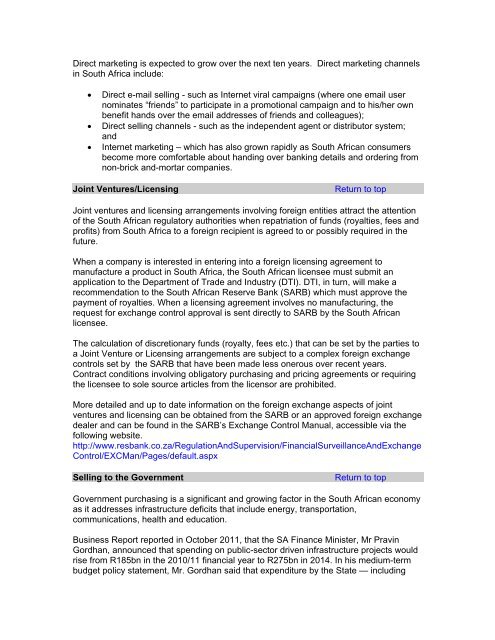South Africa - International Franchise Association
South Africa - International Franchise Association
South Africa - International Franchise Association
Create successful ePaper yourself
Turn your PDF publications into a flip-book with our unique Google optimized e-Paper software.
Direct marketing is expected to grow over the next ten years. Direct marketing channels<br />
in <strong>South</strong> <strong>Africa</strong> include:<br />
• Direct e-mail selling - such as Internet viral campaigns (where one email user<br />
nominates “friends” to participate in a promotional campaign and to his/her own<br />
benefit hands over the email addresses of friends and colleagues);<br />
• Direct selling channels - such as the independent agent or distributor system;<br />
and<br />
• Internet marketing – which has also grown rapidly as <strong>South</strong> <strong>Africa</strong>n consumers<br />
become more comfortable about handing over banking details and ordering from<br />
non-brick and-mortar companies.<br />
Joint Ventures/Licensing Return to top<br />
Joint ventures and licensing arrangements involving foreign entities attract the attention<br />
of the <strong>South</strong> <strong>Africa</strong>n regulatory authorities when repatriation of funds (royalties, fees and<br />
profits) from <strong>South</strong> <strong>Africa</strong> to a foreign recipient is agreed to or possibly required in the<br />
future.<br />
When a company is interested in entering into a foreign licensing agreement to<br />
manufacture a product in <strong>South</strong> <strong>Africa</strong>, the <strong>South</strong> <strong>Africa</strong>n licensee must submit an<br />
application to the Department of Trade and Industry (DTI). DTI, in turn, will make a<br />
recommendation to the <strong>South</strong> <strong>Africa</strong>n Reserve Bank (SARB) which must approve the<br />
payment of royalties. When a licensing agreement involves no manufacturing, the<br />
request for exchange control approval is sent directly to SARB by the <strong>South</strong> <strong>Africa</strong>n<br />
licensee.<br />
The calculation of discretionary funds (royalty, fees etc.) that can be set by the parties to<br />
a Joint Venture or Licensing arrangements are subject to a complex foreign exchange<br />
controls set by the SARB that have been made less onerous over recent years.<br />
Contract conditions involving obligatory purchasing and pricing agreements or requiring<br />
the licensee to sole source articles from the licensor are prohibited.<br />
More detailed and up to date information on the foreign exchange aspects of joint<br />
ventures and licensing can be obtained from the SARB or an approved foreign exchange<br />
dealer and can be found in the SARB’s Exchange Control Manual, accessible via the<br />
following website.<br />
http://www.resbank.co.za/RegulationAndSupervision/FinancialSurveillanceAndExchange<br />
Control/EXCMan/Pages/default.aspx<br />
Selling to the Government Return to top<br />
Government purchasing is a significant and growing factor in the <strong>South</strong> <strong>Africa</strong>n economy<br />
as it addresses infrastructure deficits that include energy, transportation,<br />
communications, health and education.<br />
Business Report reported in October 2011, that the SA Finance Minister, Mr Pravin<br />
Gordhan, announced that spending on public-sector driven infrastructure projects would<br />
rise from R185bn in the 2010/11 financial year to R275bn in 2014. In his medium-term<br />
budget policy statement, Mr. Gordhan said that expenditure by the State — including
















